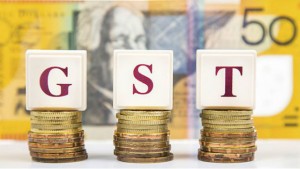Home » Commentary » Opinion » Scepticism should rule in GST debate
· ABC The Drum

 Australia: write this out 100 times: the GST is not a perfect tax. All taxes are flawed — it is just that the GST is less flawed than other taxes.
Australia: write this out 100 times: the GST is not a perfect tax. All taxes are flawed — it is just that the GST is less flawed than other taxes.
It is superficially appealing to cut a particularly flawed tax (such as the company tax) and fund this tax cut by increasing a less flawed tax (the GST). But it is never as simple as this.
Most people know the GST hits low income earners harder. So any increase in the GST will need compensation. And unfortunately, compensation has its own flaws. It will most likely be highly targeted compensation — as you work more, your compensation will decrease. And this, unsurprisingly, creates disincentives for work.
Result: reduced employment, particularly among second income earners (usually women). There are already substantial disincentives for second income earners to work. Making these disincentives worse is an unwise idea.
And all this compensation means less money for cutting the more flawed taxes, such as company tax.
Of course, we could cancel compensation for low income earners. But good luck getting that idea through Parliament. We should be reminded of the experience with the introduction of the GST in 2000: most Australians were substantially overcompensated, and yet the complaints were endemic.
There are even more issues with proposals to include food, education and health in the GST.
First, putting the GST on food (in particular) would require compensation to be even larger, exacerbating the problems raised earlier.
Second, parts of education and health spending are like saving for your future, and the whole point of a GST is that it applies to consumption and not saving. In simple terms, taxing health and education will result in some double taxation — which a GST is meant to avoid.
Third, health and education are heavily subsidised, so adding GST to these services would mean teachers, professors, doctors and nurses would all clamour for increased subsidies. It is hard to see any government ignoring these complaints. More tax on education and health, and more spending on education and health… doesn’t sound like an improvement.
And of course, increased subsidies means less money for cutting flawed taxes like the company tax (apologies for sounding like a broken record).
It might be easier for a government to resist the call for increased subsidies for private health and education. But this would aggravate other problems: both private health and education compete on a very un-level playing field with free public health and education, as subsidies for private providers are (usually) much less than the government spending on public providers. As an example, average government spending per student in public schools was $15,703 in 2012-13, while the average subsidy for each private school student was $8,812.
Therefore, adding the GST to private providers would further tilt the playing field against them. This might lead to a substantial exodus back into the public health and education systems, partly or fully eating up the tax revenue from the broader GST. While there is ongoing debate about the extent of this potential movement, the possibility of a large shift occurring cannot be ruled out.
There is another issue with GST on education. As the GST doesn’t apply to exports, it would be added to the fees for domestic students only, not international students. It isn’t clear that the Australian public would be keen on this different tax treatment.
Nevertheless, there are a few welcome signs in this debate. The Assistant Treasurer Kelly O’Dwyer has said the government does not want to increase the tax burden on Australians. We certainly don’t need taxes to go up, not while the Australian tax burden is around the historical average and set to go above the average in coming years.
And it is good that many in the public debate recognise a priority should be on cutting the worst taxes — and company tax is considered to be one of the most flawed and inefficient taxes in Australia (along with stamp duties), in research from Treasury and from KPMG. Importantly, this research confirms the GST is less flawed than many other taxes, but it still isn’t perfect.
As a result of these concerns, scepticism should rule in examining possible changes to the GST. Australia’s most flawed taxes might be reduced, but the flaws of an increased GST and compensation package might meant the change as a whole isn’t worth doing.
Michael Potter is a Research Fellow in the Economics Program at the Centre for Independent Studies.
Scepticism should rule in GST debate